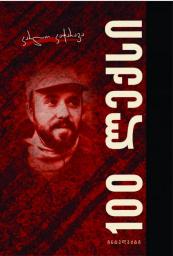Karlo Kacharava can be viewed as a documentary poet. His documentary nature is not a straight-line method of description: it uses completely polar means for narrating what has happened, and creates a convincing synthesis of the real and unreal, the earthly and heavenly. Consequently the picture and image of phenomena is formed as a document of the epoch in all its raw or gruesome state. The author was himself well aware of his documentary nature, an example of which is his longer poem called A Documentary Film. Just as in DigaVertov’sCinematic Eye, through Kacharava’s unique ‘poetic eye’ the everyday as it is seen, or one could say, as time passes, becomes more and more a classic of poetic documental art. His poems are filled by his friends, by chance acquaintances, by books which he was reading when he was writing a poem, by contemporary artists with whom he kept up a constant inner dialogue. One might say, that for genuine documentalism his poems are excessively subjective, autobiographical, but in fact the reverse is true: the poem ‘Love under Curfew’, as a disturbing document from the time when Tbilisi was under curfew, could not have survived were it not for the pot-bellied Shalva, in his long cloak, a man who ‘sang on two bottles of vodka’, nor could ‘the exhausted crowd waiting for hours outside a bakery’ have been recorded so heart-rendingly without the ghost of IgnateNinoshvili’s who ‘fights the night of those queuing for bread’. Karlo Kacharava’s social nerve is extremely acute, and it is no surprise that these characters should mostly be ‘popular’, proletarian writers, worthy representatives of the impoverished intelligentsia. In the years during which formations were changed, and there was war and devastation, he becomes a ‘one of the people’’ himself, echoing them, with a magic ritual of documentalism, and standing up for them, that he becomes a proletarian writer, even if a rather odd one, talking a language that not everyone can understand, coming from a world of élite consciousness, as it were, to write about workers, soldiers and cancer patients. Karlo Kacharava’s poetry has an astonishingly natural co-existence of the old and the new, so new, that Georgian reality actually still has no idea of it: the coexistence involves cardinally different cultural spaces: Georgian (inherited memory), Russian (with its Soviet aesthetics and the underground that opposed it) and western (often German, which he was often connected with and which had a big influence on him, on his formation as an artist and thinker). They frequently alternate with the elegance of ‘a montage of attractions’, creating a mutual exploration, or to be clearer, each cutting out its own existential signs.
‘I think that for him poetry is above all something sacral, so that he hasn’t hidden his own artistry and has always hidden his poetry. It has been sacral if only because depicting a picture was for him a natural act, while writing a poem was a violation. In any case, that’s what I think. Drawing was a natural movement for his hand, writing a poetic text was, however, something more metaphysical. In a poem he went much further, in any case he tried to escape far away. For some reason I think that he was utterly confident of his own artistry, but in his poetic work he did have occasional doubts.’
Shota Iatashvili, poet, critic
‘These poems cannot be linked to anything concrete… It is impossible to read these poems outside the context of the epoch. Of course, there are urban, post-Soviet themes, but we have to distinguish from one another the social and cultural aspects of the epoch. In the cultural aspect we cannot connect the specific epoch and the poetic achievement, which was not nourished by the former. In order to understand Karlo, we have distanced ourselves from his art, but we mustn’t say that he was more an artist than a poet. If we look at his canvases, we see the great tradition of German expressionism, and these pictures are full of texts. And just as he has texts on canvas, he also has canvases in his texts. Karlo is a poet of mood, and it is very obvious that he is both an artist and a poet.’
Shota Dighmelashvili, critic, poet
Extract will be available soon
In case of using the information, please, indicate the source. 